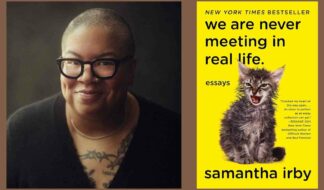A child's death is inconceivable. But Mary Griffith didn't have to imagine it; she lived it. When her son, Bobby, leaned backward off a bridge into oncoming traffic, taking his life at just 20, the fervent churchgoer's perfect world tumbled head-first too.
With Sigourney Weaver at the gripping core of "Prayers for Bobby," a true story shot over the summer in metro Detroit and premiering at 9 p.m. Jan. 24 on Lifetime, the tragic story of a son fighting for his mother's acceptance – and the mother's religious conflict to give it – remarkably escapes the doomed fate of TV movies.
Thanks to Weaver, who is bitterly cold, playing Griffith as someone who, when Bobby (impeccably played by Ryan Kelley of indie gem "Mean Creek") comes out, pretends he's a stranger and dismisses him as casually as a foe. "I won't have a gay son," she lashes out moments before the expected climax – Bobby's death, the instrument that makes Griffith re-examine her faith.
As it should. But before undergoing her transformation, Mary's all-American family, living in California during the '80s, is caught dealing with Bobby's revelation. And their picture-perfect six-some – achieved by an opening home-video of their smiley, happy kin frolicking in the yard – is pulverized. Divided, too.
While most of the family is empathetic to Bobby, they're mostly resistant to speaking up to Mary, who becomes increasingly frustrated, but still unflappable, when prayer and hanging with the boys doesn't seem to beget the flip-flop she wants. Or needs, rather, if she wants to, as she says, see the family together in the afterlife.
She goes to crazy extremes, trying to help Bobby rid himself of what she thinks is a mental disorder, to fight for her own self-deluded yearnings. She demands Bobby not stand with his hand on his hip – "like a girl," she says. She sets him up on dates with chicks. All of it's done out of love and desperation, and especially fear, and Weaver plays Griffith with such unwavering conviction, that she remarkably builds a sympathetic bond with us. We know she's off her rocker, but we're still rooting for her to change.
Her wake-up call, unfortunately, comes too late. And when it does, Mary falls into an abyss of remorse, sinking deeper with each new misunderstood journal entry she reads from Bobby's diary. And she takes us down with her.
While the first half of "Prayers for Bobby" focuses on their broken relationship, the 20-year-old's struggle and eventual suicide, the after-death moments muster a riveting glassy-eyed Weaver performance, raw, gritty and make-up free. The kind worthy of an Emmy nod.
Stealing scene after scene, Weaver plays Griffith with a weary stillness, and a persistent – sometimes frantic – need for answers. Dreams emerge, memories strike. Particularly affecting is a scene in which a reflective Weaver, sitting outside, stares into the cold, dead air, realizing, with the images of a swing-set and a red wagon, all she's lost.
Based on Leroy Aarons' 1996 book, and directed by Russell Mulcahy (director of several first-season "Queer As Folk" episodes), "Prayers for Bobby" isn't an easy film. It is, like the novel, emotionally demanding – and wholly devastating – but hopeful when Griffith, who becomes a gay rights crusader, does a 180. And though Weaver is the pic's centerpiece, avoiding becoming an over-the-top archetype, Ryan Kelley as Bobby gives a sympathetic, natural performance, making his outsider character exceedingly accessible, gay or not. When Bobby, shaken and bawling, retorts to his mother's "I won't have a gay son" blow by telling her, "Then, mom, you don't have a son," it's crushing. And hauntingly real as we imagine what many other Bobbys, especially with new research about a strong link between home life and gay youth, are dealing with.
Even what seemed like a glimmer of hope – a new, older man, David (Scott Bailey), who Bobby meets at a gay club and becomes his confidante – fails him. And when it does, his world crashes. And he can't bear to face any more rejection.
Bailey's role is underwritten, and his acting doesn't hold up as well reflected next to Kelley's – with whom he has little chemistry. Also, some of the dialogue seems unnatural, especially in a tiff between Weaver and Kelley outside a restaurant. And a few scenes leave unanswered questions. Was it just a coincidence that the priest popped up at the church in the dead of the night – a rainy one, at that – only to find a weepy Weaver?
Still, it's strongly acted, frequently throat-gulping, and Katie Ford's teleplay juggles homosexuality and religion without cushioning the issues. "Prayers for Bobby" – an uplifting force headed by Weaver, an eye-catching clout – is the tube's answer to "Milk."
"Before you echo 'amen' in your home or place of worship, think and remember … a child is listening," Griffith says during a television address. She's right. And let's hope parents are, too, because this heart-hitting juggernaut has the power to inspire. And, best, save lives. A-
'Prayers for Bobby'
9 p.m. Jan. 24
Lifetime
Affirmations will host a viewing party during the movie's premiere. For more information, visit http://www.goaffirmations.org or http://www.mylifetime.com, and for other premiere events, see Happenings on page XX










